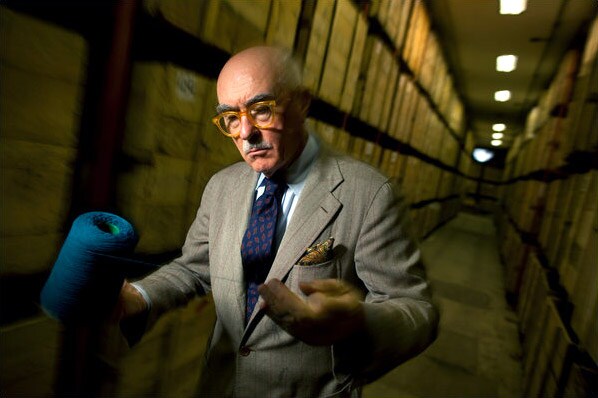In Italy, choosing tradition over growth
Like much of the Italian economy, the Carlo Barbera factory is struggling and for reasons, according to academics, that say just about everything you need to know about what ails Italy.
-
 Luciano Barbera in the 'spa' of his factory near Biella, Italy. This area is a high-humidity area where the fabrics are "rested" after being stressed by the weaving process. (NYT Photo)
Luciano Barbera in the 'spa' of his factory near Biella, Italy. This area is a high-humidity area where the fabrics are "rested" after being stressed by the weaving process. (NYT Photo) -
 The exterior of Mr. Barbera's factory, which, like much of Italy's economy, is struggling. (NYT Photo)
The exterior of Mr. Barbera's factory, which, like much of Italy's economy, is struggling. (NYT Photo) -
 Stored fabric in the factory. At roughly 41 euros a meter ($48.75 a yard), the average price of the fabric that the Carlo Barbera factory produces today is almost double that of competitors in the area. (NYT Photo)
Stored fabric in the factory. At roughly 41 euros a meter ($48.75 a yard), the average price of the fabric that the Carlo Barbera factory produces today is almost double that of competitors in the area. (NYT Photo) -
 In the late '90s, the mill enjoyed record annual sales of what amounts to about $15.5 million, Mr. Barbera says. Last year, the figure was half that sum. (NYT Photo)
In the late '90s, the mill enjoyed record annual sales of what amounts to about $15.5 million, Mr. Barbera says. Last year, the figure was half that sum. (NYT Photo) -
 Fabrics are examined for flaws at the factory. (NYT Photo)
Fabrics are examined for flaws at the factory. (NYT Photo) -
 Today the Barbera line is sold in stores like Barney's and Neiman Marcus. Handmade suits sell for $4,000. (NYT Photo)
Today the Barbera line is sold in stores like Barney's and Neiman Marcus. Handmade suits sell for $4,000. (NYT Photo) -
 Fabric being woven at the factory in Biella. (NYT Photo)
Fabric being woven at the factory in Biella. (NYT Photo) -
 The number of men buying bespoke suits has plunged in recent years, as the workplace becomes more casual. (NYT Photo)
The number of men buying bespoke suits has plunged in recent years, as the workplace becomes more casual. (NYT Photo) -
 A seamstress worked on a jacket in the design building. (NYT Photo)
A seamstress worked on a jacket in the design building. (NYT Photo) -
 The company has long been a niche player whose fabrics are sought by high-end buyers. (NYT Photo)
The company has long been a niche player whose fabrics are sought by high-end buyers. (NYT Photo) -
 Luciano Barbera, right, with his daughter Carola Barbera, center, and one of their employees in the fabric factory. (NYT Photo)
Luciano Barbera, right, with his daughter Carola Barbera, center, and one of their employees in the fabric factory. (NYT Photo) -
 A suit jacket on display in the factory. (NYT Photo)
A suit jacket on display in the factory. (NYT Photo) -
 A Luciano Barbera suit in the company's Milan showroom. (NYT Photo)
A Luciano Barbera suit in the company's Milan showroom. (NYT Photo) -
 Mr. Barbera with his daughter Carola in their design studio. Mr. Barbera says that the "Made in Italy" label is used too loosely, diluting the national brand. (NYT Photo)
Mr. Barbera with his daughter Carola in their design studio. Mr. Barbera says that the "Made in Italy" label is used too loosely, diluting the national brand. (NYT Photo)
Advertisement
Advertisement
Advertisement
Advertisement
